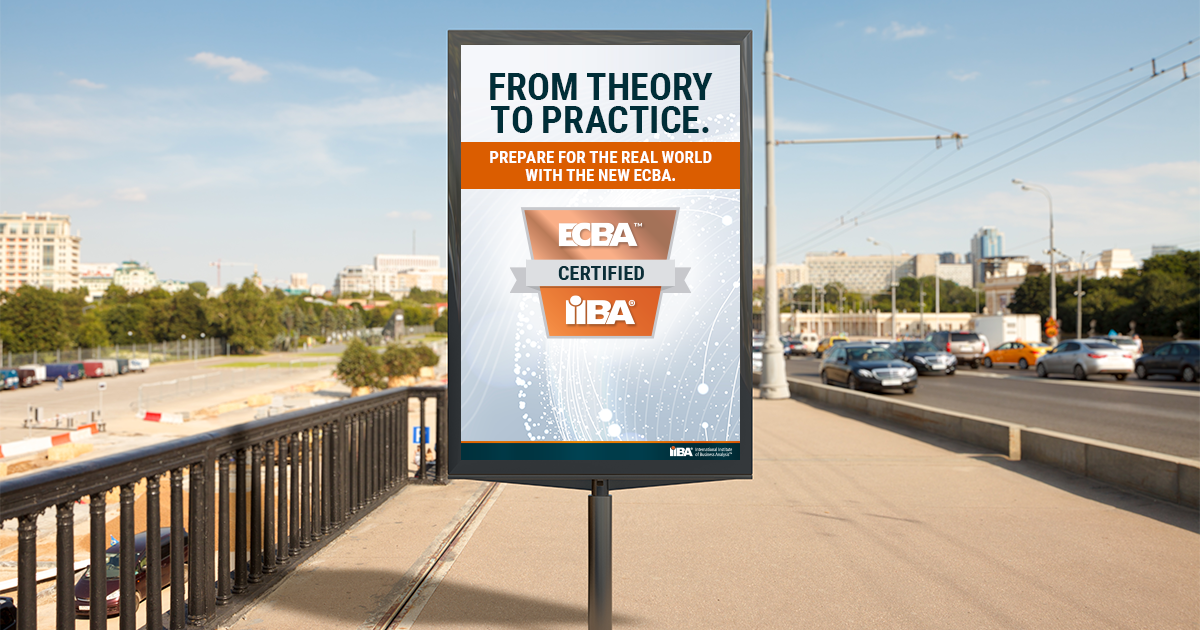Getting Real-World Ready With the New ECBA: What You Need to Know
Key Takeaways
The Entry Certificate in Business Analysis (ECBA) has evolved to meet the demands of today’s dynamic workplace.
- Why the change? With AI automating foundational tasks and employers expecting job-ready professionals, the ECBA now emphasizes applied knowledge over theory, bridging the gap between expectations and capabilities
- Certificate vs. certification: The ECBA is a certificate, acknowledging foundational knowledge without ongoing renewal requirements, making it an accessible starting point for early-career professionals
- Applied knowledge focus: The updated ECBA tests real-world application of business analysis concepts, aligning with the BACCM and The Business Analysis Standard to reflect workplace realities
- Research-driven updates: Guided by global studies, practitioner input, and nearly 300 volunteer hours, the new ECBA is built on what foundational business analysis looks like in 2025
- Who it’s for: Designed for early-career professionals or career changers, the ECBA signals readiness to contribute without requiring mastery, striking the perfect balance between credibility and accessibility

The world of business analysis is changing—and so is the Entry Certificate in Business Analysis (ECBA). In a recent episode of Business Analysis Live, I sat down with Tyler Kenny, the product manager behind the ECBA evolution, to talk about what’s new, what’s driving the change, and why it matters to aspiring and current business analysis professionals alike.
If you're considering the ECBA or curious about how foundational-level certifications are keeping pace with workplace demands, this blog (and the episode it's based on) will get you up to speed.
Why the ECBA Changed
The ECBA has always been a gateway for those entering the business analysis profession. But with rapid changes in technology and organizational expectations, it was time for a refresh, or more accurately, an evolution.
As Tyler explained, two major forces influenced this shift:
- The rise of AI: Tools that automate foundational work like note-taking and data analysis have changed what early-career professionals are expected to do. Instead of simply performing tasks, analysts now need to oversee and refine automated outputs.
- Expectation vs. capability gap: Employers expect new professionals to hit the ground running. That’s a tall order if a certificate only covers theory. The new ECBA bridges this gap by adding applied knowledge and real-world readiness to the mix.
Certificate vs. Certification: What's the Difference?
Tyler clarified an important distinction: the ECBA is a certificate, not a certification. That means it represents a snapshot in time—an acknowledgement of your knowledge and capability at the foundational level—with no renewal or ongoing professional development requirements.
While it may lack the depth of more advanced certifications, it remains a globally recognized and accessible way for early-career professionals or career changers to show they're ready to bring structure to complexity, solve problems, and apply a strategic lens that helps connect day-to-day analysis to big-picture business goals.
Applied Knowledge Takes Centre Stage
A major update to the ECBA is its shift from being purely knowledge-based to incorporating applied knowledge. In other words, it’s not just about memorizing terms or definitions anymore. Instead, it’s about demonstrating that you understand how to apply business analysis concepts in real-world scenarios. Tyler put it best: “We didn’t make it harder; we made it more accurate.”
This move reflects the real demands of the workplace. New professionals must think strategically and deliver outcomes, not just understand theory. The new ECBA supports this by aligning more closely with the Business Analysis Core Concept Model (BACCM) and The Business Analysis Standard.
Built on Research, Not Opinions
This wasn’t an overnight update or a shot in the dark. The changes to the ECBA were guided by extensive research, including:
- Interviews with hiring managers and team leaders
- Surveys of practitioners and organizations
- A global practice analysis study led by a third-party vendor
- Volunteer input from the IIBA community (nearly 300 hours of volunteer time!)
The result? A certification that reflects what foundational business analysis actually looks like in 2025.
Resources to Support Your Journey
With the new ECBA format launching July 21, there’s no shortage of resources to help candidates prepare. From The Business Analysis Standard (a free download) to updated study materials and sample questions, IIBA has ensured that candidates have what they need to succeed.
And these resources aren’t static—Tyler emphasized that they’re always evolving based on community feedback. You can access all of these on our website.
Who Is the ECBA For?
The ECBA is for anyone who wants to add value to their organization through business analysis. It was developed to strike a balance between employer expectations and what early-career professionals can realistically deliver. If it’s too easy, it loses credibility. If it’s too hard, it becomes inaccessible.
This version of the ECBA is built to say, “I’m ready to contribute,” not “I’ve already mastered everything.” It’s a stepping stone, one that opens doors without demanding perfection. With this evolution, we're confident we've hit the sweet spot.
Keeping Pace With Today’s Businesses
The workplace is changing quickly. As Tyler aptly puts it, “Life is coming at us fast,” and the ECBA needs to keep pace. Its evolution ensures that the ECBA continues to offer real value, equipping new professionals with the skills and confidence to deliver outcomes in today’s dynamic business environments.
Whether you’re a prospective candidate, a team lead, or someone exploring how AI and strategic thinking are reshaping foundational-level roles, this episode delivers valuable insights from behind the scenes.
Want the full story? Watch it now and hear directly from the team behind the changes.
Psst… Did you know that from June 1 to July 20, members who don’t pass their first ECBA attempt will receive a second attempt at no additional cost? You heard correctly! Our free rewrite promotion is a great way to boost confidence and encourage early exam participation. Secure your free rewrite today. Terms and conditions apply.
About the Author

Susan hosts Business Analysis Live to discuss business analysis topics and answer questions from the live audience. There's a backlog of upcoming topics and she's happy to take suggestions. Add a comment to one of our videos to suggest a topic you would like Susan to cover in an upcoming episode or connect with her via email at live@iiba.org.


